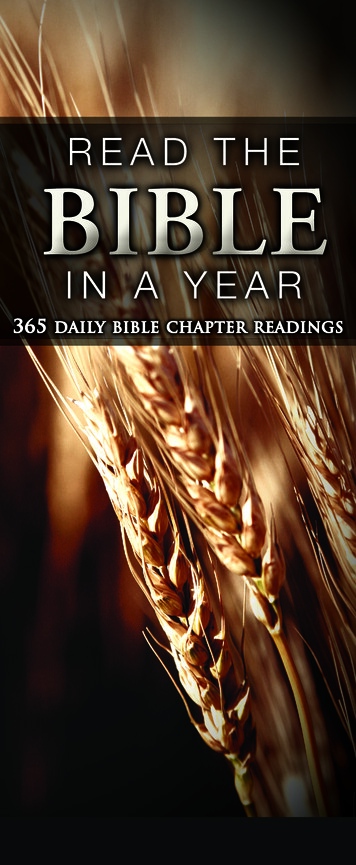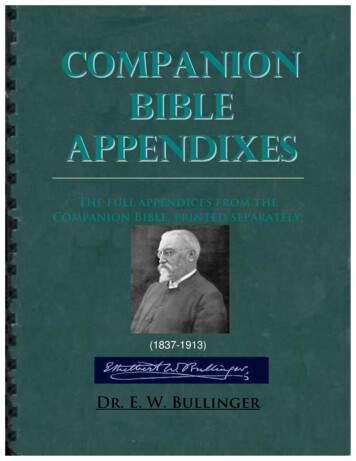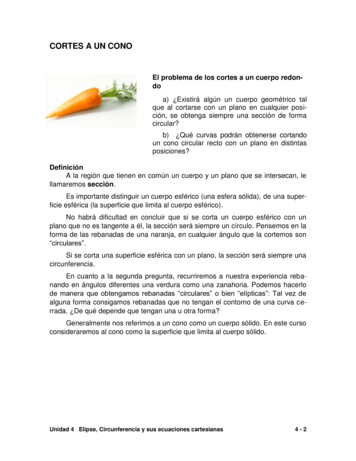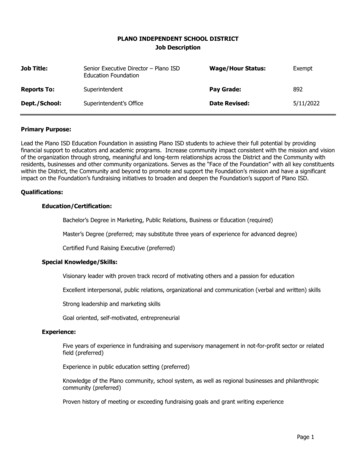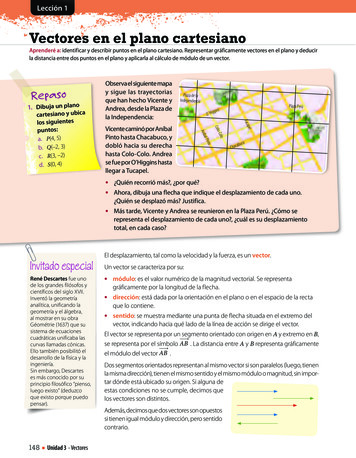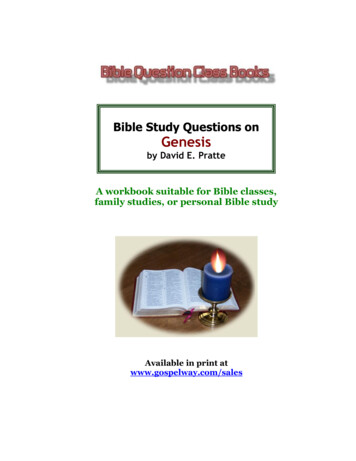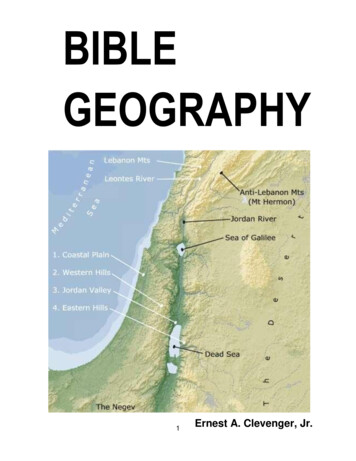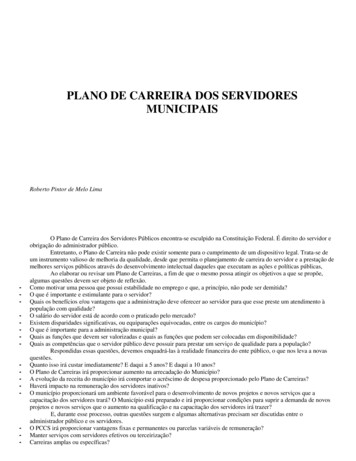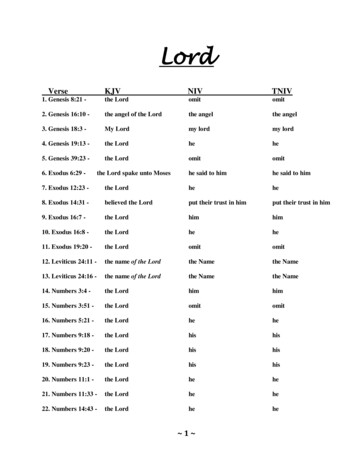
Transcription
Notes onGenesis2 0 2 2 E d i t i o nDr. Thomas L. ConstableTITLEEach book of the Pentateuch (the first five books of the Old Testament,called "The Pentateuch" since about A.D. 160, called "The Torah"[instruction] by the Jews), originally received its title in the Hebrew Biblefrom the first word or words in the book. There are three divisions in theHebrew Bible: The Law (Torah), The Prophets, and The Writings (cf. Luke24:44).1 The Torah was originally one book, but the translators of theSeptuagint (Greek) version (ca. 250 B.C.) divided it into the five books thatwe have. The Jews regarded the stories in the Torah as divine instructionfor them, as well as the commandments and sermons, since they too teachtheology and ethics.The English title "Genesis" has come to us from the Latin Vulgatetranslation (Liber Genesis) made by the early church father Jerome (ca.A.D. 390). The Latin title came from the Septuagint translation. "Genesis"is a transliteration of the Greek word geneseos, the Greek word thattranslates the Hebrew toledot. This Hebrew word is the key word inidentifying the structure of Genesis, and the English translators haveusually rendered it "account" or "generations" or "history" or "records"(2:4; 5:1; 6:9; 10:1; 11:10, 27; 25:12, 19; 36:1, 9; 37:2).21SeeAppendix 1 at the end of these notes for a table showing four canons of the OldTestament (Hebrew Bible): Jewish, Protestant, Roman Catholic, and Eastern Orthodox. Seealso Floyd V. Filson, Which Books Belong in the Bible? pp. 73-100. See Randall Price,Searching for the Original Bible, pp. 36-42, for a concise explanation of the origin anddevelopment of the whole Old Testament.2See Jason S. Derouchie, "The Blessing-Commission, The Promised Offspring, and TheToledot Structure of Genesis," Journal of the Evangelical Theological Society 56:2 (June2013):219-47; Jared M. August, "The Toledot Structure of Genesis: Hope of Promise,"Bibliotheca Sacra 174:695 (July-September 2017):267-82.Copyright Ó 2022 by Thomas L. Constable
Dr. Constable's Notes on Genesis22022 EditionDATEThe events recorded date back to the creation of the world.Many Christians believe the earth is millions of years old. They usually basethis belief on the statements of scientists and understand Scripture in thelight of these statements. Likewise, many Christians believe that the humanrace began hundreds of thousands of years ago for the same reason.Many evangelicals believe that the earth is not much older than 10,000years. They base this on the genealogies in Scripture (Gen. 5; 10; 11; etal.), which they understand to be "open" (i.e., not complete).1 Evangelicalsusually hold to a more recent date for man's creation—more recent thanthe millions of years that evolutionists postulate—for the same reason."The history of man on the earth may easily be more than thesupposed six thousand years and with no violence to thetestimony of the Sacred Text."2Another group of evangelicals believes that these genealogies are either"closed" (i.e., complete) or very close to complete. This leads them to datethe creation of the world and man about 6,000 years ago. I shall discussthe question of how we should interpret the genealogies in the expositionof the chapters where they occur.Many interpreters have placed the date of composition of Genesis muchlater than Moses' lifetime. Some of them do this because Genesis containssome names that became common designations of people and places afterMoses' time (e.g., the Philistines, Dan, et al.). I shall discuss these anomaliesin the exposition to follow as we come to them. See also the section below:"Writer." If one accepts Mosaic authorship, as most conservativeevangelicals do, the date of composition of Genesis must be within Moses'lifetime (ca. 1525-1405 B.C.). This book was perhaps originally intendedto encourage the Israelites to trust in their faithful, omnipotent God as theyanticipated entrance into the Promised Land from Kadesh Barnea or from1E.g.,Andrew E. Steinmann, "Gaps in the Genealogies in Genesis 5 and 11?" BibliothecaSacra 174:694 (April-June 2017):141-58.2Lewis S. Chafer, Systematic Theology, 2:137.
2022 EditionDr. Constable's Notes on Genesis3the Plains of Moab.1 Moses may have written it earlier to prepare them forthe Exodus,2 but this seems less likely to me. Another guess is that Moseswrote it during the 38 years of wilderness wanderings.3 No one knows forsure.WRITERThe authorship of the Pentateuch (Gr. penta, "five," and teuchos, "a casefor carrying papyrus scrolls" and, in later usage, the "scrolls" themselves),has been the subject of great controversy among professing Christians,since Spinoza promoted "higher criticism" of the Bible in the seventeenthcentury. The "documentary hypothesis," which grew out of his work, is thatMoses did not write the Pentateuch, as most scholars in Judaism and thechurch until that day believed. Instead, it was the product of several writerswho lived much later than Moses. A redactor (editor) or redactorscombined these several documents into the form we have now. Thesedocuments (J, E, D, P, and others) represent: a Yahwistic (Jehovistic)tradition (supposedly dating from the ninth century B.C.), an Elohistictradition (eighth century B.C.), a Deuteronomic tradition (seventh centuryB.C.), a Priestly tradition (fifth century B.C.), etc. The subject of OldTestament Introduction deals with these matters.4 One reliable scholarsummed up the present state of this controversy as follows:" the documentary hypothesis is shaky at best and beforelong may have to be given up entirely by the scholarly world."5The evidence that Moses wrote the Pentateuch seems conclusive if onebelieves that Jesus Christ spoke the truth when He attributed theauthorship to Moses (Matt. 19:8; Mark 7:10; Luke 16:29-31; 20:37; 24:27;1EugeneH. Merrill, "A Theology of the Pentateuch," in A Biblical Theology of the OldTestament, p. 30. See Walther Zimmerli, "Abraham," Journal of Northwest SemiticLanguages 6 (1978):49-60.2E.g.,Kenneth Kitchen, "The Old Testament in its Context: 1 From the Origins to the Eveof the Exodus," Theological Students' Fellowship Bulletin 59 (1971):9.3H. C. Leupold, Exposition of Genesis, 1:8.4See especially Tremper Longman III and Raymond B. Dillard, An Introduction to the OldTestament, pp. 42-51. Or see Gleason L. Archer Jr., A Survey of Old TestamentIntroduction, pp. 81-104. For a more extensive discussion see R. K. Harrison, Introductionto the Old Testament, pp. 3-82.5Kitchen, p. 78.
4Dr. Constable's Notes on Genesis2022 EditionJohn 7:19, 22; cf. Acts 15:1). Jesus Christ did not specifically say thatMoses wrote Genesis, but in our Lord's day the Jews regarded thePentateuch (Torah) as a whole unit. They recognized Moses as the authorof all five books.1 Consequently they would have understood what Jesussaid about any of the five books of Moses as an endorsement of the Mosaicauthorship of them all.2"Just west of Abydos in southern Egypt, the Wadi el-Hol siteyielded an alphabetic inscription carved on the underface of aledge. Palaeographically it resembled a text found at Serabital-Khadem in the Sinai Peninsula from 1600 B.C., which until1993 was the earliest alphabet ever found. But the Wadi Holexample is at least two hundred years older, dating from thetime Jacob and his sons lived in Egypt. The argument thatMoses could not have written the Torah in alphabetic form thatearly (ca. 1400 B.C.) thus has no basis."3How did Moses receive this information? He may have done so in either oftwo ways. Perhaps Adam and Eve told the creation story to theirdescendants, and they passed it on to succeeding generations orally and/orin written form (i.e., tradition). Moses' mother may have told him thesestories as a child. If so, God guarded the true account. The other ancient1See,for example, the testimony of Flavius Josephus, a first-century Jewish-Christianwriter, to the Mosaic authorship of the Pentateuch, in Against Apion, 1:8.2Oswald T. Allis' The Five Books of Moses is a classic rebuttal of the denial that Moseswrote all five books. No one has discredited it, though many liberal scholars have ignoredit. More recently, Kenneth Kitchen's series of six articles, "The Old Testament in itsContext" in Theological Students' Fellowship Bulletin (1971-72), especially the sixtharticle, refuted "the fashionable myth" (p. 9) of the evolution of Israel's religion asproposed by Julius Wellhausen and his followers. Another excellent rebuttal by a Jewishscholar, Umberto Cassuto, is his The Documentary Hypothesis. For a review of othersubsequent approaches scholars have pursued in the study of Genesis (i.e., the formcritical, tradition-historical, and rhetorical-critical), see Allen P. Ross, Creation and Blessing,pp. 27-35; Victor P. Hamilton, The Book of Genesis: Chapters 1—17, pp. 11-38; HerbertM. Wolf, An Introduction to the Old Testament Pentateuch, pp. 71-78.3Eugene Merrill, "The Veracity of the Word: A Summary of Major Archaeological Finds,"Kindred Spirit 34:3 (Winter 2010):13.
2022 EditionDr. Constable's Notes on Genesis5Near Eastern accounts were perversions of what really happened.1 Anotherpossibility is that God revealed the creation account directly to Moses.2The New Testament writers quoted or alluded to Genesis over 60 times in17 books.SCOPEThe events recorded in Genesis stretch historically from Creation toJoseph's death, a period of at least 2,300 years. The first part of the book(ch. 1—11) is not as easy to date precisely as the second part (ch. 12—50). The history of the patriarchs recorded in this second main division ofthe text covers a period of about 300 years.The scope of the book progressively and consistently narrows. That is,Genesis begins with the creation of the cosmos and ends with the death ofone man: Joseph.PURPOSEThe selection of content included in Genesis points to the purpose of thedivine author: to reveal the history of and basic principles involved in God'srelationship with people.3Genesis provides the historical basis for the rest of the Pentateuch and theBible. Chapters 1—11 give historical background essential to understandingGod's covenant relationship with humankind, and chapters 12—50 recordthe Abrahamic Covenant and its initial outworking. The AbrahamicCovenant continues to be the basic arrangement by which God bringsblessing to humanity throughout the Pentateuch and the rest of the Bible."The real theme of the Pentateuch is the selection of Israelfrom the nations and its consecration to the service of Godand His Laws in a divinely appointed land. The central event inthe development of this theme is the divine covenant with1SeeJohn D. Davis, Genesis and Semitic Tradition, pp. 1-22.an extended discussion of Mosaic authorship, see G. Herbert Livingston, ThePentateuch in its Cultural Environment, pp. 205-68.3See the chart "Chronology of Genesis," in John J. Davis, Paradise to Prison, p. 29.2For
Dr. Constable's Notes on Genesis62022 EditionAbraham and its promise to make his offspring into thepeople of God and to give them the land of Canaan as aneverlasting inheritance."1" the book may also be said to be the story of God's freegrace in establishing Israel for Himself as His people."2Genesis provides an indispensable prologue to the drama that unfolds inExodus and the rest of the Pentateuch. The first 11 chapters constitute aprologue to this prologue."Two opposite progressions appear in this prologue [chs. 1—11]: (a) God's orderly Creation with its climax in His blessingof man, and (b) the totally disintegrating work of sin with itstwo greatest curses being the Flood and the dispersion atBabel.3 The first progression demonstrates God's plan to bringabout perfect order from the beginning in spite of what thereader may know of man's experience. The second progressiondemonstrates the great need of God's intervention to providethe solution for the corrupt human race."4The practical purpose of Genesis is to encourage the reader to trust andobey God. Originally, the purpose was to encourage the Israelites to trustand obey God. Regardless of when Moses may have written Genesis, thiswas his obvious purpose, as is clear from what he wrote. He wanted toprepare the Israelites for the future by reminding them of the past. This isits function for us today as well. As we read the text, we should continuallyask ourselves, "What did this mean to the original readers?" That is whatGod intended it to mean to us today, not whatever we may think it means.This is one of the cardinal rules of interpreting any piece of literature,including the Bible.One of Moses' main points in Genesis was that the same God who createdIsrael had created the universe. And His word was the key instrument increating both entities. As He had brought order, fullness, and rest to thematerial world, so He could do for His chosen people. He is the sovereign1MosesH. Segal, The Pentateuch: Its Composition and Its Authorship and Other BiblicalStudies, p. 23.2Leupold,1:9.Kidner, Genesis: An Introduction and Commentary, p. 13.4Ross, "Genesis," in The Bible Knowledge Commentary: Old Testament, p. 21.3Derek
2022 EditionDr. Constable's Notes on Genesis7of the universe, its ultimate authority. Therefore mankind should trust andobey Him.THEOLOGYThe real hero of Genesis is the LORD God, and its stories deal with the originand life of the believing community under His sovereignty.1"What gives the Old Testament its force and unity is theaffirmation of the sovereignty of God. God is the basis of allthings and all that exists only exists by his will."2"What comes into our minds when we think about God is themost important thing about us."3"The subject matter of the theology in Genesis is certainlyGod's work in establishing Israel as the means of blessing thefamilies of the earth. This book forms the introduction to thePentateuch's main theme of the founding of the theocracy,that is, the rule of God over all Creation. It presents the originsbehind the founding of the theocracy: the promised blessingthat Abraham's descendants would be in the land."Exodus presents the redemption of the seed out of bondageand the granting of a covenant to them. Leviticus is the manualof ordinances enabling the holy God to dwell among His peopleby making them holy. Numbers records the militaryarrangement and census of the tribes in the wilderness, andshows how God preserves His promised blessings from internaland external threats. Deuteronomy presents the renewal ofthe covenant."In the unfolding of this grand program of God, Genesisintroduces the reader to the nature of God as the sovereignLord over the universe who will move heaven and earth toestablish His will. He seeks to bless mankind, but does not1Inthese notes, I capitalize LORD when referring to Yahweh, as do many English translationsof the Bible.2Edmond Jacob, Theology of the Old Testament, p. 37.3A. W. Tozer, The Knowledge of the Holy, p. 9.
Dr. Constable's Notes on Genesis82022 Editiontolerate disobedience and unbelief. Throughout this revelationthe reader learns that 'without faith it is impossible to pleaseGod' (Heb. 11:6)."1STRUCTUREThe structure of Genesis is very clear. The phrase "the generations of" (AV,ESV, toledot in Hebrew, from yalad meaning "to bear, to generate") occursten times (really eleven times since 36:9 repeats 36:1), and in each caseit introduces a new section of the book.2 The Jews regarded "ten" as thesymbolical number of completeness.3"The person named is not necessarily the main character butis the beginning point of the section that also closes with hisdeath."4The first part of Genesis is introductory, or a prologue, and sets the scenefor what follows in the book. An outline of Genesis based on this structureis as follows:1.Introduction 1:1—2:32.The generations of heaven and earth 2:4—4:263.The generations of Adam 5:1—6:84.The generations of Noah 6:9—9:295.The generations of the sons of Noah 10:1—11:96.The generations of Shem 11:10-267.The generations of Terah 11:27—25:111Ross,"Genesis," p. 26. For further discussion of the theology of the Pentateuch, seeWolf, pp. 23-40.2For an extended discussion of the structure of Genesis based on the occurrences oftoledot, see Kenneth A. Mathews, Genesis 1—11:26, pp. 25-41; Ross, "Genesis," pp. 2226. AV refers to The Holy Bible: Authorized King James Version of 1611, 1952 reprint,and ESV refers to The Holy Bible: English Standard Version of 2001.3Alfred Edersheim, The Temple, p. 137.4Longman and Dillard, p. 53.
2022 EditionDr. Constable's Notes on Genesis8.The generations of Ishmael 25:12-189.The generations of Isaac 25:19—35:2910.The generations of Esau 36:1-4311.The generations of Jacob 37:1—50:269As noted above, Moses' movement was from the general to the specificthroughout the book:Part I (chs. 1-11): at least 2,000 yearsPart II (chs. 12-50): about 300 yearsTotal: at least 2,300 yearsOUTLINEA full expository outline designed to highlight the relative emphases of thebook follows. I shall follow this outline in these notes as I seek to unpackthe message of the book. I am translating toledot here as "what becameof."I.Primeval events 1:1—11:26A.The story of creation 1:1—2:31.2.3.4.B.What became of the creation 2:4—4:261.2.3.C.An initial statement of creation 1:1Conditions at the time of creation 1:2The six days of creation 1:3-31The seventh day 2:1-3The Garden of Eden 2:4—3:24The murder of Abel 4:1-16The spread of civilization and sin 4:17-26What became of Adam 5:1—6:81.The effects of the curse on humanity ch. 5
Dr. Constable's Notes on Genesis102.D.II.The Flood 6:9—8:22The Noahic Covenant 9:1-17The curse on Canaan 9:18-29What became of Noah's sons 10:1—11:91.2.F.God's sorrow over man's wickedness 6:1-8What became of Noah 6:9—9:291.2.3.E.2022 EditionThe table of nations ch. 10The dispersion at Babel 11:1-9What became of Shem 11:10-26Patriarchal narratives 11:27—50:26A.What became of Terah 6.17.18.B.C.Terah and Abram's obedience 11:27—12:9Abram in Egypt 12:10-20Abram's separation from Lot ch. 13Abram's military victory ch. 14The Abrahamic covenant ch. 15The birth of Ishmael ch. 16The sign of circumcision ch. 17Yahweh's visit to Abraham 18:1-15Abraham's intercession for Lot 18:16-33The destruction of Sodom ch. 19Abraham’s sojourn at Gerar ch. 20The birth of Isaac 21:1-21Abimelech's treaty with Abraham 21:22-34The sacrifice of Isaac 22:1-19The descendants of Nahor 22:20-24The purchase of Sarah's tomb ch. 23The choice of a bride for Isaac ch. 24Abraham's death 25:1-11What became of Ishmael 25:12-18What became of Isaac 25:19—35:291.Isaac's twin sons 25:19-26
2022 Edition2.3.4.5.6.7.8.9.10.11.12.13.14.15.D.E.11The sale of the birthright 25:27-34Isaac and Abimelech 26:1-11Isaac's wells 26:12-33Jacob's deception for Isaac's blessing 26:34—28:9Jacob's vision at Bethel 28:10-22Jacob's marriages and Laban's deception 29:1-30Jacob's mishandling of God's blessings 29:31—30:24Jacob's new contract with Laban 30:25-43Jacob's flight from Haran ch. 31Jacob's attempt to appease Esau 32:1-21Jacob at the Jabbok 32:22-32Jacob's meeting with Esau and his return to Canaan ch.33The rape of Dinah and the revenge of Simeon and Levich. 34Jacob's return to Bethel ch. 35What became of Esau 36:1—37:1What became of Jacob ohnDr. Constable's Notes on GenesisGod's choice of Joseph 37:2-11The sale of Joseph into Egypt 37:12-36Judah and Tamar ch. 38Joseph in Potiphar's house ch. 39The prisoners' dreams and Joseph's interpretations ch.40Pharaoh's dreams and Joseph's interpretation ch. 41Joseph's brothers' first journey into Egypt ch. 42Joseph's brothers' second journey into Egypt ch. 43Joseph's last test and its results ch. 44Joseph's reconciliation with his brothers 45:1-15Israel's move to Egypt 45:16-46:30Joseph's wise leadership 46:31—47:27Jacob's worship in Egypt 47:28—48:22Jacob's blessing of his sons 49:1-28Deaths and a promise yet to be fulfilled 49:29—50:261H. Sailhamer, "Genesis," in Genesis-Numbers, vol. 2 of The Expositor's BibleCommentary, pp. 6-14, has given helpful insights into the purpose and literary form of thePentateuch, which he based on its structure. See Casper J. Labuschagne, "The Pattern of
12Dr. Constable's Notes on Genesis2022 EditionMESSAGEWhat is the Bible all about? I would state it as follows: God desires to glorifyHimself by blessing humankind.A young boy burst into the living room and announced to his father, "I knowwhat the Bible means!" His father smiled and replied, "What do you mean,you 'know' what the Bible means?" His son replied, "I do know!" "Okay,"said the father, "Tell me what the Bible means." "It's easy, Daddy. It standsfor 'Basic Information Before Leaving Earth.'"G. Campbell Morgan summarized the whole Bible by saying that the OldTestament is a revelation of human need, and the New Testament is arevelation of the divine supply that meets that need. He also believed thatwithin the Pentateuch we hear the sigh for a priest, in the historical bookswe hear a cry for a king, and in the poetical and prophetical books we findthe quest for a prophet.1The message of the Pentateuch can be stated this way: People canexperience God's blessing by trusting Him (believing His Word) and byobeying Him (following His initiative).I believe Genesis is in the Bible primarily to teach us the following lesson:People can enjoy a personal relationship with God, and thereby realize theirown fulfillment as human beings—only through trust in God and obedienceto God. This is what I would call the message statement of the book.Genesis reveals that God is faithful to His promises and powerful enough tobring them to fulfillment.Genesis reveals that God originally intended people to have an immediate(nothing between) relationship with their Creator. Evidences for this arethat God made man in His own image (1:26-27). Second, He regarded manas His son (1:28-30). Third, He made man as a special creation (2:7).Fourth, He made man with special care (2:7). And fifth, He consistentlydemonstrated concern for man's welfare (3:9).the Divine Speech Formulas in the Pentateuch: The Key to Its Literary Structure," VetusTestamentum 23:3 (July 1982):268-96, for a different approach to determining thestructure of Genesis through Numbers.1G. Campbell Morgan, The Unfolding Message of the Bible, p. 25.
2022 EditionDr. Constable's Notes on Genesis13God's immediate relationship with Adam was broken by the Fall (ch. 3). Inthe Fall, man did two things: First, he failed to trust God's goodness withhis mind. And, second, he rebelled against God's authority with his will(3:6).God then took the initiative to re-establish the relationship with man thatHe had created man to enjoy. He provided atonement for man's sin untilHe would finally remove it. This temporary covering came through thesacrificial system. Animal sacrifices covered peoples’ sins adequately, butnot completely. A final sacrifice had to be made that would remove our sinspermanently. God accepted sacrifices for sin before Calvary like a merchantaccepts a credit card in payment for goods or services. A final payment stillhad to be made, and Christ's death was that final payment.Throughout Genesis, we see that people in general consistently failed totrust and obey God (e.g., in Noah's day, at Babel, and throughout thepatriarchal period).Genesis also records what God has done to encourage people to trust andobey Him. It is only by living by these two principles, trust and obedience,that people can enjoy a relationship with God and realize all that Godcreated them to experience.On the one hand, Genesis reveals much about the person and work of God.This revelation helps us to trust and obey Him. It is through His personalrevelations to the main characters in Genesis that God revealed Himselfinitially (e.g., Adam and Eve, Noah, and the patriarchs).On the other hand, Genesis reveals much about the nature of man. Not onlydid God reveal the perversity and depravity of fallen man, but He alsoidentified many positive examples of faith and obedience in the lives of thegodly.In Genesis we learn that faith in God is absolutely essential if we are to havefellowship with Him and realize our potential as human beings.Faith is the law of life. If one lives by faith, he flourishes, but if he does not,he fails. The four patriarchs are primarily examples of what faith is and howit manifests itself. In each of their lives we learn something new about faith.Abraham's faith demonstrates unquestioning obedience. When God toldhim to do something, he almost always did it. This is the most basic
14Dr. Constable's Notes on Genesis2022 Editioncharacteristic of faith. That is one reason Abraham has been called "thefather of the faithful." God revealed Himself nine times to Abraham (12:13, 7; 13:14-17; 15; 17:1-21; 18; 21:12-13; 22:1-2; 22:15-18), and eachtime Abraham's response was unquestioning obedience.Isaac's faith helps us see the quality of passive acceptance thatcharacterizes true faith in God. This was his response to God's tworevelations to him (26:2-5, 24). Sometimes Isaac was too passive.Jacob's story is one of conflict with God until he came to realize his ownlimitations: then he trusted God. We can see his faith in his acknowledgeddependence on God. God's seven revelations to him eventually led him tothis place (28:12-15; 31:3, 11-13; 32:24-29; 35:1, 9-12; 46:2-4). Mostbelievers today can identify with Jacob most easily, because we toostruggle with wanting to live independent of God.Joseph's life teaches us what God can do with a person who trusts Himconsistently in the face of adversity. The outstanding characteristic ofJoseph's life was his faithful loyalty to God. He believed God's tworevelations to him in dreams (37:5-7, 9), even though God's will did notseem to be working out as he thought it would. Patient faith and its rewardshine through the story of Joseph. The Lord Jesus supremely illustratesthis quality of faith, though He also illustrates the others perfectly.Faith, the key concept in Genesis, means trusting that what God hasprescribed is indeed best for me, and demonstrating that trust by waitingfor God to provide what He has promised. A "person of faith" is one whocommits to acting on this basis—even though he or she may not see howGod's way is best.The Pentateuch is all about God, man, and our mutual relationship. The keyconcept in Genesis is faith.1Morgan introduced his comments on Genesis with the following admission:"How many people have read the Book of Genesis? I do notmean study it. I have been studying it for sixty years and I donot know it yet. Its heights and depths are beyond me and that1Seeidem, Living Messages of the Books of the Bible, 1:1:13-26.
2022 EditionDr. Constable's Notes on Genesis15is the glory of the Bible. It may exhaust you, but you can neverexhaust it."1May all the readers of these notes follow Morgan's admirable example ofrepeated studying and learning from this great book.1Idem,The Unfolding , p. 25.
Dr. Constable's Notes on Genesis16I.2022 EditionPRIMEVAL EVENTS 1:1—11:26Chapters 1—11 provide an introduction to the Book of Genesis, thePentateuch, and the whole Bible."Although the story of the Bible begins in Genesis 12, that isnot where the Bible begins. It begins with what we nowrecognize as a prologue, a preparatory statement, so that wemay be informed and equipped to understand the story thatfollows."1"What we find in chaps. 1—11 is the divine initiation ofblessing, which is compromised by human sin followed bygracious preservation of the promise: blessing – sin - grace."2"His [Moses'] theological perspective can be summarized intwo points. First, the author intends to draw a line connectingthe God of the Fathers and the God of the Sinai covenant withthe God who created the world. Second, the author intends toshow that the call of the patriarchs and the Sinai covenanthave as their ultimate goal the reestablishment of God'soriginal purpose in Creation."3"Evidently an interest in the way in which the world andhumankind came into existence and in the history of theearliest times was characteristic of the ancient civilized world.At any rate, various 'origin stories' or 'creation myths' aboutthe activities of a variety of creator-gods are still extant inwhat remains of the literatures of ancient Egypt and ancientMesopotamia. But the combination of such accounts withnarratives about more recent times testifies to an additionalmotivation. The aim of such works was to give their readers—or to strengthen—a sense of national or ethnic identity,1CharlesC. Cochrane, The Gospel According to Genesis, p. 4.p. 60.3Sailhamer, p. 19. Cf. Mathews, p. 77.2Mathews,
2022 EditionDr. Constable's Notes on Genesis17particularly at a time when there was for some reason a degreeof uncertainty or hesitation about this "The placing of Gen. 1—11 as a prologue to the main body ofthe work also afforded the opportunity to express certaindistinctively Israelite articles of faith which it would have beenmore difficult to introduce into the later narratives, particularlywith regard to the doctrine of God."1"Gen 1—11 as we read it is a commentary, often highly critical,on ideas current in the ancient world about the natural andsupernatural world. Both individual stories as well as the finalcompleted work seem to be a polemic against many of thecommonly received notions about the gods and man. But theclear polemical thrust of Gen 1—11 must not obscure the factthat at certain points biblical and extrabiblical thought are inclear agreement. Indeed Genesis and the ancient Near Eastprobably have more in common with each other than either haswith modern secular thought."2W. H. Griffith Thomas summed up the contents of the first 11 chapters ofGenesis memorably as: creation, corruption, deluge, deliverance, anddispersal.3A.THE STORY OF CREATION 1:1—2:3God created the entire universe, and then formed and filled it, i
2See Jason S. Derouchie, "The Blessing-Commission, The Promised Offspring, and The Toledot Structure of Genesis," Journal of the Evangelical Theological Society 56:2 (June 2013):219-47; Jared M. August, "The Toledot Structure of Genesis: Hope of Promise," Bibliotheca Sacra 174:695 (July-September 2017):267-82. 2 Dr. Constable's Notes on Genesis 2022 Edition DATE The events recorded date back .
